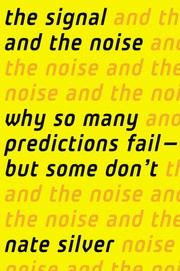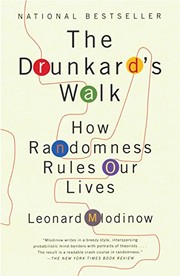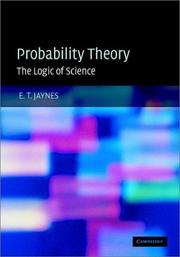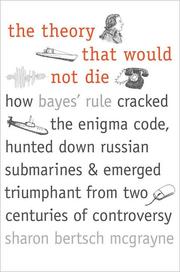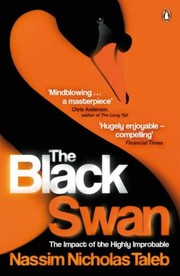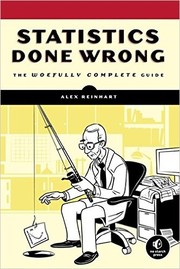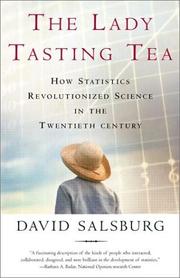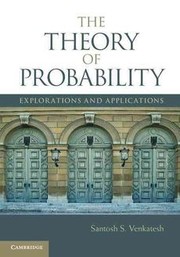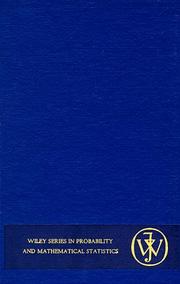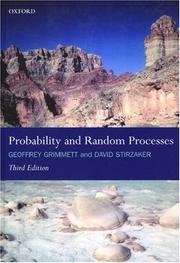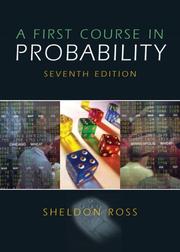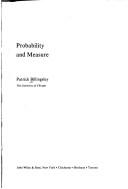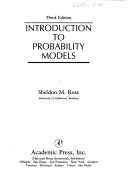Are you a fan of numbers, statistics, and the thrill of uncertainty? If so, you’ll love diving into the world of probability with these 20 best books about probability. Whether you’re a beginner looking for an introduction to the concept or a seasoned pro seeking advanced techniques, there’s a book on probability for everyone. From practical applications in finance and sports to the theoretical foundations of probability theory, these books will expand your understanding and appreciation of this fascinating field. Let’s explore the top probability books that will keep you on the edge of your seat with every turn of the page.
Contents
- 1 20 Best Probability Books
- 2 The Signal and the Noise: Why So Many Predictions Fail – But Some Don’t
- 3 Thinking, Fast and Slow
- 4 The Drunkard’s Walk: How Randomness Rules Our Lives
- 5 Probability Theory: The Logic of Science
- 6 The Theory That Would Not Die: How Bayes’ Rule Cracked the Enigma Code, Hunted Down Russian Submarines, and Emerged Triumphant from Two Centuries of Controversy
- 7 The Black Swan: The Impact of the Highly Improbable
- 8 Statistics Done Wrong: The Woefully Complete Guide
- 9 The Lady Tasting Tea: How Statistics Revolutionized Science in the Twentieth Century
- 10 The Book of Why: The New Science of Cause and Effect
- 11 The Theory of Probability: Explorations and Applications
- 12 Introduction to Probability
- 13 An Introduction to Probability Theory and Its Applications
- 14 Probability and Random Processes
- 15 Probability: A Graduate Course
- 16 Probability and Statistics
- 17 A First Course in Probability
- 18 Probability and Measure
- 19 Probability and Random Processes
- 20 Introduction to Probability Models
- 21 Understanding Probability
- 22 Final Thoughts on Best Probability Books
- 23
20 Best Probability Books
The Signal and the Noise: Why So Many Predictions Fail – But Some Don’t
by Nate Silver
The Signal and the Noise: Why So Many Predictions Fail – But Some Don’t by Nate Silver is a fascinating book on probability that delves into the art and science of prediction. Silver, a renowned statistician and founder of FiveThirtyEight, explores the challenges of making accurate forecasts in a world inundated with data. He aptly illustrates the distinction between the “signal” – the true information that can help us make reliable predictions – and the “noise” – the irrelevant, random factors that can lead to faulty forecasts.
Through captivating examples from various fields such as finance, sports, and weather forecasting, Silver demonstrates the common pitfalls of prediction and the importance of distinguishing between what is meaningful and what is merely noise. This thought-provoking book about probability provides valuable insights into how we can improve our ability to make better forecasts in an uncertain world. Whether you’re a data enthusiast or simply curious about the challenges of prediction, The Signal and the Noise is a compelling read that will leave you questioning the reliability of forecasts and the role of probability in our lives.
Thinking, Fast and Slow
by Daniel Kahneman
Thinking, Fast and Slow by Daniel Kahneman is a thought-provoking exploration of the human mind and decision-making. The book delves into the two systems that drive the way we think: the fast, intuitive, and emotional system, and the slow, deliberate, and logical system. Kahneman, a Nobel Prize-winning psychologist, offers valuable insights into how these two systems shape our judgments and choices.
Through engaging anecdotes and compelling research, Kahneman provides a deep understanding of cognitive biases, heuristics, and the impact of probability on decision-making. The book offers readers a fascinating journey into the complexities of the mind and the errors of judgment that can arise from relying on intuition and flawed thinking. Thinking, Fast and Slow is a must-read for anyone interested in understanding human behavior, decision-making, and the intricacies of the mind. It is a captivating probability book that challenges readers to reconsider their perceptions and thought processes.
The Drunkard’s Walk: How Randomness Rules Our Lives
by Leonard Mlodinow
The Drunkard’s Walk: How Randomness Rules Our Lives by Leonard Mlodinow is a fascinating exploration of the role of chance and randomness in our everyday lives. Mlodinow takes readers on a captivating journey through the world of probability, using real-life examples to illustrate how random events shape our experiences and decisions. From the stock market to sports, from medicine to politics, Mlodinow shows how the principles of randomness influence every aspect of our lives.
This captivating book about probability delves into the unpredictable nature of our world, challenging our assumptions and shedding light on the hidden forces that govern our lives. With engaging storytelling and clear explanations, Mlodinow demystifies complex concepts and makes the intricate world of probability accessible to all readers. Whether you’re a math enthusiast or simply curious about the role of chance in our lives, The Drunkard’s Walk is a thought-provoking and enlightening read that will forever change the way you perceive the world around you.
Probability Theory: The Logic of Science
by E.T. Jaynes
Probability Theory: The Logic of Science by E.T. Jaynes is a groundbreaking book on the principles and applications of probability. This acclaimed work challenges traditional views on probability and presents a fresh, logical approach to understanding uncertainty and making decisions based on incomplete information. Jaynes introduces the concept of probability as a measure of our state of knowledge rather than a property of the physical world, revolutionizing the way we think about uncertainty and inference.
This seminal book about probability explores the foundation of Bayesian probability, providing a comprehensive and rigorous framework for reasoning and decision-making under uncertainty. Jaynes’ clear, insightful writing and thought-provoking examples make this probability book essential reading for anyone interested in the theory and practical applications of probability. Whether you’re a student, researcher, or professional in a wide range of fields, Probability Theory: The Logic of Science will deepen your understanding of uncertainty and its role in scientific reasoning and everyday life.
The Theory That Would Not Die: How Bayes’ Rule Cracked the Enigma Code, Hunted Down Russian Submarines, and Emerged Triumphant from Two Centuries of Controversy
by Sharon Bertsch McGrayne
The Theory That Would Not Die: How Bayes’ Rule Cracked the Enigma Code, Hunted Down Russian Submarines, and Emerged Triumphant from Two Centuries of Controversy by Sharon Bertsch McGrayne is a fascinating exploration of the history and impact of Bayesian statistics. This gripping book about probability delves into the story of Thomas Bayes, the British mathematician who developed Bayes’ rule in the 18th century, and the subsequent controversy and debates surrounding its applications.
McGrayne takes readers on a journey through time, highlighting how Bayesian methods have been used to solve real-world problems, from cracking the Enigma code during World War II to tracking Russian submarines during the Cold War. The probability book also sheds light on the ongoing debates and skepticism that Bayesian statistics has faced throughout history, making it a compelling read for anyone interested in the intersection of mathematics, history, and real-world applications.
The Black Swan: The Impact of the Highly Improbable
by Nassim Nicholas Taleb
The Black Swan: The Impact of the Highly Improbable by Nassim Nicholas Taleb is a groundbreaking book on probability that challenges our understanding of randomness and uncertainty. Taleb introduces the concept of “black swan events,” which are rare and unpredictable occurrences that have a massive impact on the world. Drawing on examples from finance, history, and science, he argues that these unpredictable events shape our world more than we realize. The book explores the limitations of human knowledge and the dangers of relying too heavily on predictions and forecasts. Taleb’s engaging writing style and thought-provoking ideas make this a must-read for anyone interested in understanding the unpredictable nature of the world. Whether you’re a student of probability or simply curious about the hidden forces that shape our lives, The Black Swan is a thought-provoking and eye-opening read that will challenge your assumptions about the nature of randomness and uncertainty.
Statistics Done Wrong: The Woefully Complete Guide
by Alex Reinhart
Statistics Done Wrong: The Woefully Complete Guide by Alex Reinhart is a compelling book about the pitfalls and misconceptions that people often encounter when working with statistics. Reinhart skillfully uncovers the common mistakes made in statistical analysis and provides clear explanations on how to avoid them. This book is a valuable resource for anyone who wants to understand and apply statistics accurately, whether they are a student, researcher, or professional.
Reinhart’s engaging writing style and real-world examples make this book on probability accessible and relevant to a wide audience. By debunking common statistical fallacies and offering practical advice, the author equips readers with the knowledge and tools to navigate the complex world of statistics with confidence.
Whether you’re new to statistics or a seasoned practitioner, Statistics Done Wrong is an essential read for anyone who wants to improve their statistical literacy and avoid the pitfalls of faulty analysis. This probability book will leave you with a deeper understanding of statistics and a newfound appreciation for the importance of getting it right.
The Lady Tasting Tea: How Statistics Revolutionized Science in the Twentieth Century
by David Salsburg
The Lady Tasting Tea: How Statistics Revolutionized Science in the Twentieth Century by David Salsburg is a captivating book about probability and its impact on scientific progress. Salsburg takes readers on a journey through the development of statistical methods and their crucial role in shaping the modern world. Through engaging storytelling and clear explanations, he explores the fundamental concepts of probability, from its origins to its application in fields such as medicine, genetics, and psychology.
By delving into real-life examples and the stories of the pioneering statisticians who shaped the discipline, Salsburg demonstrates the profound influence of probability on our understanding of the world. Whether you are a seasoned statistician or a curious reader with no prior knowledge of the subject, this book offers a fascinating insight into the power of probability and its transformative impact on scientific inquiry. The Lady Tasting Tea is a must-read for anyone interested in the history and significance of statistical thinking in the modern era.
The Book of Why: The New Science of Cause and Effect
by Judea Pearl and Dana Mackenzie
The Book of Why: The New Science of Cause and Effect, written by Judea Pearl and Dana Mackenzie, is a thought-provoking exploration of the fundamental concept of causality. This captivating book delves into the intricate connections between cause and effect, challenging traditional views and offering a fresh perspective on how we understand the world around us.
By combining insights from statistics, computer science, and philosophy, the authors present a compelling argument for a new way of thinking about causality. They demonstrate how this shift in perspective can revolutionize fields such as medicine, economics, and artificial intelligence, leading to more accurate predictions and better decision-making.
Whether you’re a curious reader interested in the mysteries of cause and effect or a seasoned expert in the field of probability, this book is a fascinating journey into the heart of causality. With its engaging storytelling and thought-provoking ideas, The Book of Why is a must-read for anyone seeking a deeper understanding of the intricate web of causation that shapes our lives.
The Theory of Probability: Explorations and Applications
by Santosh S. Venkatesh
The Theory of Probability: Explorations and Applications by Santosh S. Venkatesh is a comprehensive book on probability that delves into the fascinating world of chance and uncertainty. This engaging book about probability provides a thorough exploration of the fundamental concepts of probability theory and its diverse applications in various fields.
From its theoretical foundations to real-world applications, Venkatesh’s book offers a clear and insightful overview of probability, covering topics such as random variables, probability distributions, and statistical inference. The author’s lucid writing style and illustrative examples make complex concepts accessible to readers, making this probability book an invaluable resource for students, academics, and professionals alike.
Whether you are a novice seeking to understand the basics of probability or an experienced practitioner looking to deepen your knowledge, The Theory of Probability: Explorations and Applications is a must-read that will enhance your understanding of this essential branch of mathematics and its practical applications.
Introduction to Probability
by Joseph K. Blitzstein and Jessica Hwang
Introduction to Probability by Joseph K. Blitzstein and Jessica Hwang is a comprehensive and engaging book on probability. It provides a clear and accessible introduction to the fundamental concepts of chance and uncertainty, making it an essential read for anyone interested in understanding the principles of probability.
The book covers a wide range of topics, including basic probability, random variables, expectation, and limit theorems. It also includes numerous examples and exercises to help readers develop their understanding and problem-solving skills. The authors’ approachable writing style and real-world examples make this probability book a valuable resource for students, professionals, and anyone looking to gain a deeper understanding of probability.
Whether you’re new to the subject or looking to refresh your knowledge, Introduction to Probability is an excellent choice for anyone seeking a comprehensive and engaging introduction to the fascinating world of chance and uncertainty.
An Introduction to Probability Theory and Its Applications
by William Feller
An Introduction to Probability Theory and Its Applications by William Feller is a classic book on probability that has been widely acclaimed for its comprehensive coverage and clear explanations. Feller’s work is considered a cornerstone in the field, providing an in-depth exploration of probability theory and its practical applications. The text is approachable yet rigorous, making it suitable for both students and professionals seeking a solid foundation in probability.
Readers can expect to delve into topics such as random variables, distribution functions, and stochastic processes, all presented in a systematic and logical manner. Feller’s writing style is engaging and accessible, with numerous examples and exercises to reinforce understanding. Whether you’re a newcomer to the world of probability or looking to deepen your knowledge, this book about probability is a valuable resource that will undoubtedly enhance your grasp of this fascinating subject.
Probability and Random Processes
by Geoffrey Grimmett and David Stirzaker
Probability and Random Processes by Geoffrey Grimmett and David Stirzaker is a comprehensive book on the principles and applications of chance and random behavior. This esteemed probability book provides a clear and engaging introduction to the fundamental concepts of probability theory and random processes, making it an essential resource for students and professionals in various fields.
The book covers a wide range of topics, including probability spaces, random variables, and Markov chains, offering a thorough understanding of the probabilistic foundations that underpin many real-world phenomena. With its accessible writing style and numerous illustrative examples, readers can easily grasp complex concepts and apply them to practical problems.
Whether you’re a student delving into the intricacies of probability or a professional seeking to enhance your understanding of random processes, this book about probability is an invaluable asset. It equips readers with the knowledge and tools necessary to analyze and interpret uncertainty, making it an indispensable resource for anyone interested in the fascinating world of chance and randomness.
Probability: A Graduate Course
by Allan Gut
Probability: A Graduate Course by Allan Gut is a comprehensive and rigorous book on the subject of probability. As a graduate-level text, it is designed for students and professionals who are already familiar with the fundamentals of probability theory and are seeking a deeper understanding of the topic.
The book delves into advanced concepts such as conditional probability, martingales, and stochastic processes, providing a thorough exploration of these complex ideas. Allan Gut’s clear and insightful writing style makes the material accessible, despite its complexity, and the numerous examples and exercises throughout the book help to reinforce the learning process.
Whether you are a graduate student looking to deepen your understanding of probability or a professional seeking to expand your knowledge in the field, Probability: A Graduate Course offers a valuable resource for further study and exploration. With its in-depth coverage of advanced topics and its clear, engaging presentation, this book about probability is a must-have for anyone looking to master this fascinating and important subject.
Probability and Statistics
by Morris H. DeGroot and Mark J. Schervish
Probability and Statistics by Morris H. DeGroot and Mark J. Schervish is an essential book on probability and statistics that provides a comprehensive and accessible introduction to the subject. This book about probability covers the fundamental concepts and techniques of probability theory, including random variables, distributions, and the laws of large numbers. The authors also delve into statistical inference, covering topics such as estimation, hypothesis testing, and regression analysis.
Readers will appreciate the clear explanations and numerous examples that help to illustrate the concepts and their real-world applications. The book on probability also includes exercises and problems to test and reinforce understanding, making it a valuable resource for students and professionals alike.
Whether you are new to the subject or looking to deepen your understanding of probability and statistics, this probability book is an excellent choice. With its engaging writing style and comprehensive coverage, Probability and Statistics by DeGroot and Schervish is a must-have for anyone interested in mastering the principles of probability and statistics.
A First Course in Probability
by Sheldon Ross
A First Course in Probability by Sheldon Ross is a renowned book on probability that provides an accessible introduction to the subject. Ross’s clear and engaging writing style makes this book about probability an ideal choice for students and professionals alike. The book covers a wide range of topics, including random variables, expectation, and various distributions, making it a comprehensive resource for anyone looking to develop a strong foundation in the field of probability.
Readers will appreciate the numerous examples and exercises throughout the book, which help reinforce key concepts and enhance understanding. With its practical approach and real-world applications, A First Course in Probability is not just a probability book, but a valuable tool for those seeking to apply probability theory to their everyday lives and professional endeavors. Whether you are a student looking to grasp the fundamentals of probability or a professional seeking to expand your knowledge, this book is an indispensable resource for anyone interested in the fascinating world of chance and uncertainty.
Probability and Measure
by Patrick Billingsley
Probability and Measure by Patrick Billingsley is a renowned text that delves deep into the intricate world of probability theory. This classic book about probability provides a comprehensive introduction to the fundamental concepts of measure theory and probability. Billingsley’s clear and concise writing style makes this book on probability accessible to both students and professionals in the field.
Readers are guided through the essential topics of probability, including random variables, laws of large numbers, and central limit theorems. The author’s expertise shines through as he skillfully navigates through the complex theories, making them understandable and engaging.
Probability and Measure is a must-have for anyone seeking a thorough understanding of probability and measure theory. Whether you are a student looking to build a solid foundation in the subject or a seasoned professional in need of a reliable reference, this probability book is an invaluable resource that will enhance your knowledge and deepen your appreciation for the beauty of probability theory.
Probability and Random Processes
by Geoffrey Grimmett, David Stirzaker
Looking for a comprehensive book about probability? Look no further than “Probability and Random Processes” by Geoffrey Grimmett and David Stirzaker. This essential resource provides a thorough introduction to the fundamental concepts of probability and random processes, making it an indispensable guide for students and professionals alike.
The authors present the material in a clear and accessible manner, offering a perfect balance of theory and practical applications. Readers will delve into the fascinating world of probability through a wide range of topics, including random variables, Markov chains, and stochastic processes.
Whether you’re a student seeking a solid foundation in probability or a professional looking to enhance your understanding of random processes, this probability book is an invaluable resource. With its engaging writing style and numerous examples and exercises, “Probability and Random Processes” is a must-have for anyone interested in mastering the intricacies of probability.
Introduction to Probability Models
by Sheldon Ross
Introduction to Probability Models by Sheldon Ross is a comprehensive book on probability that provides a thorough understanding of the concepts and applications of probability. The book covers a wide range of topics, including random variables, Markov chains, and queuing theory, making it a valuable resource for students and professionals in various fields, such as engineering, business, and the sciences.
Ross presents the material in a clear and accessible manner, with numerous examples and exercises to help readers grasp the key concepts and develop their problem-solving skills. The book also includes discussions on real-world applications of probability, demonstrating its relevance in diverse areas of study and practice.
Whether you’re new to probability or looking to deepen your understanding of the subject, Introduction to Probability Models offers a comprehensive and engaging approach to learning about probability.
Understanding Probability
by Henk Tijms
Understanding Probability by Henk Tijms is a comprehensive and accessible book on the fascinating world of chance and uncertainty. Tijms takes readers on a journey through the fundamental concepts of probability, from basic principles to more advanced topics, making it a perfect read for both beginners and experienced enthusiasts in the field.
The book about probability covers a wide range of applications, including gambling, insurance, and decision-making, providing real-world examples to illustrate the relevance of probability in everyday life. Tijms’ clear and engaging writing style makes complex concepts easy to understand, making this probability book an invaluable resource for anyone looking to grasp the intricacies of chance and randomness.
Understanding Probability offers a perfect blend of theory and practical insights, making it an essential addition to the library of anyone interested in understanding the principles of uncertainty and randomness. Whether you’re a student, professional, or simply curious about the world of chance, this book on probability is sure to broaden your understanding and appreciation of the subject.
Final Thoughts on Best Probability Books
In conclusion, these 20 best books about Probability offer a comprehensive and insightful exploration of this fascinating subject. Whether you’re a novice or an expert, these books provide valuable knowledge and practical applications of probability theory. From classic texts to modern interpretations, there’s something for everyone in this diverse collection. Dive into these books and enhance your understanding of probability in an engaging and enlightening way.
Which book about Probability is best?
The best book on Probability can vary with personal preference, but three widely recommended titles are:
- The Signal and the Noise: Why So Many Predictions Fail – But Some Don’t by Nate Silver,
- Thinking, Fast and Slow by Daniel Kahneman,
- The Drunkard’s Walk: How Randomness Rules Our Lives by Leonard Mlodinow.
Each offers valuable insights and could be a great starting point.
What are the best books to learn about Probability?
For those looking to learn about Probability, there is a wealth of literature that can provide a comprehensive understanding of the subject. Some of the most highly recommended books include:
- The Signal and the Noise: Why So Many Predictions Fail – But Some Don’t by Nate Silver,
- Thinking, Fast and Slow by Daniel Kahneman,
- The Drunkard’s Walk: How Randomness Rules Our Lives by Leonard Mlodinow,
- Probability Theory: The Logic of Science by E.T. Jaynes,
- The Theory That Would Not Die: How Bayes’ Rule Cracked the Enigma Code, Hunted Down Russian Submarines, and Emerged Triumphant from Two Centuries of Controversy by Sharon Bertsch McGrayne,
- The Black Swan: The Impact of the Highly Improbable by Nassim Nicholas Taleb,
- Statistics Done Wrong: The Woefully Complete Guide by Alex Reinhart,
- The Lady Tasting Tea: How Statistics Revolutionized Science in the Twentieth Century by David Salsburg,
- The Book of Why: The New Science of Cause and Effect by Judea Pearl and Dana Mackenzie,
- The Theory of Probability: Explorations and Applications by Santosh S. Venkatesh
These books offer a range of perspectives on Probability, covering various aspects and approaches to the subject.
What are the best books about Probability?
The best books about Probability are:
- The Signal and the Noise: Why So Many Predictions Fail – But Some Don’t by Nate Silver,
- Thinking, Fast and Slow by Daniel Kahneman,
- Introduction to Probability by Joseph K. Blitzstein and Jessica Hwang,
- An Introduction to Probability Theory and Its Applications by William Feller,
- The Lady Tasting Tea: How Statistics Revolutionized Science in the Twentieth Century by David Salsburg,
- The Black Swan: The Impact of the Highly Improbable by Nassim Nicholas Taleb.
Each offers unique insights into the subject. While these books about Probability are highly regarded, it’s important to note that any list of ‘best’ books is subjective and reflects a range of opinions.
What are the best Probability books of all time?
Choosing the best Probability books of all time can vary depending on who you ask, but five titles that are often celebrated include
- The Signal and the Noise: Why So Many Predictions Fail – But Some Don’t by Nate Silver,
- Thinking, Fast and Slow by Daniel Kahneman,
- The Theory That Would Not Die: How Bayes’ Rule Cracked the Enigma Code, Hunted Down Russian Submarines, and Emerged Triumphant from Two Centuries of Controversy by Sharon Bertsch McGrayne,
- The Lady Tasting Tea: How Statistics Revolutionized Science in the Twentieth Century by David Salsburg,
- and Introduction to Probability by Joseph K. Blitzstein and Jessica Hwang.
Each of these books has made a significant impact in the field of Probability and continues to be influential today.

